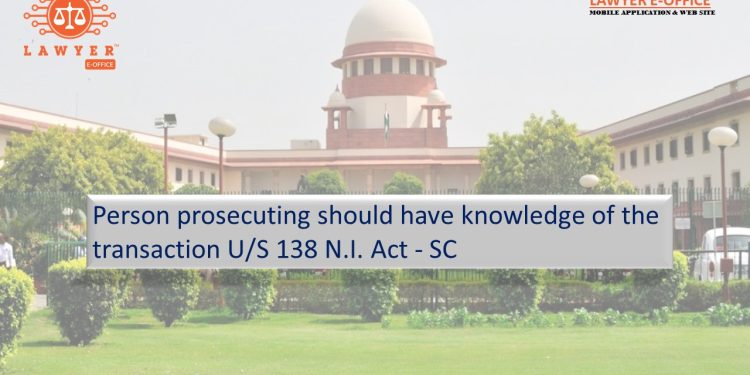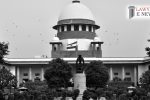Person prosecuting should have knowledge of the transaction U/S 138 N.I. Act – SC

D.D: -22 February 2022
Apex Court held in the recent judgement that a company is the payee of a cheque based on which a complaint is filed under Section 138 of N.I. Act, the complainant necessarily should be the Company which would be represented by an employee who is authorized. All that is necessary is to demonstrate before the learned Magistrate that the complaint filed is in the name of the “payee” and that the person prosecuting the complaint has knowledge of the transaction. Such averment and prima facie material is sufficient for the Magistrate to take cognizance and issue process.
The respondent issued seven cheques dated March 13, 2015, totaling Rs.1,100,00,000/ (Rupees one crore ten lakhs) to the appellant. The Bank dishonoured the cheques and returned them with the note ‘account closed’. So, the appellant sent notices dated 14.04.2015 by registered mail, acknowledgment due. Despite receipt of notices on April 16, 2015, the respondent has yet to comply or respond. In this regard, the appellant filed a complaint under Sections 138 and 142 of the Negotiable Instruments Act (1881). The complaint was filed based on an affidavit instead of an oral sworn statement. Satisfied, the learned SDJM took cognizance of the complaint and summoned the respondent-accused on 05.11.2015.
The respondent filed a petition to quash summoning order on the ground that the complaint filed by an incompetent person without the requisite averments in the complaint, and contended that Mr. Subhasis Kumar Das, General Manager (Accounting) who had filed the complaint representing the complainant company, neither had knowledge about the alleged transaction, nor had he witnessed the same. Considering this, the respondent argues that the order of cognizance and summons issued to them should be quashed.
High court quashed the complaint and summoning Order. Aggrieved complainant approached the Apex Court.
Appellant contended that High Court has utterly misconstrued the principle enunciated in A.C.Narayanan vs. State of Maharashtra & Anr. (2014) 11 SCC 790 to nonsuit the appellant. The agreement dated 18.07.2014, entered between the appellant and respondent would disclose that Subhasis Kumar Das, General Manager (Accounting) who had represented the company in the complaint, was a witness to the said agreement. The complaint was filed in accordance with law and the learned Magistrate having applied his mind, had taken cognizance which was quashed by the High Court. Learned senior counsel would also point out that Mr. Subhasis Kumar Das was authorized by the Managing Director on 23.05.2015, to initiate legal proceedings.
Respondent while opposing the appeal contended that complaint filed did not satisfy the requirement of Section 142 of N.I. Act as the complaint was not filed by a person who was authorized by the company. The High Court has arrived at its conclusion by relying on a decision rendered by this Court, such a decision would not call for interference in this appeal.
Apex Court observed that anyone can set the criminal law in motion by filing a complaint of facts constituting an offence, before a Magistrate entitled to take cognizance. The eligibility criteria prescribed by Section 142 of N.I. Act is that the complainant must be by the payee or the holder in due course. Complaint under NI Act was filed on behalf of “payee” company with due authorisation. Complaint was filed by Mr Subhasis Kumar Das, General Manager (Accounting). The Managing Director has been delegated all powers necessary for the management and operation of the company through document annexure 16 and 17. Documents disclose that the complaint under Section 138 NI Act was filed on behalf of the “payee” company with due authorisation.
While observing the other aspect on which the High Court has interfered that there is no averment in the complaint as to whether the General Manager (Accounting) had any knowledge about the transaction or he was a witness to the transaction, Apex Court replied the transaction between the parties is based on the agreement dated 18.07.2014 (Annexure P1). In the said document witness on behalf of the appellant company is none other than Mr. Subhasis Kumar Das who was at that point in time, designated as General Manager (Commercial). Further, when the cheques were dishonoured , Mr. Subhasis Kumar Das, General Manager (Accounting) had issued the notices on behalf of the appellant company, to the respondent company. The documents show that the person who knew about and witnessed the transaction was authorised to file the complaint on behalf of the company. Quashing order set aside.
M/s TRL Krosaki Refractories Ltd.
Versus
M/s SMS Asia Private Limited & Anr.






